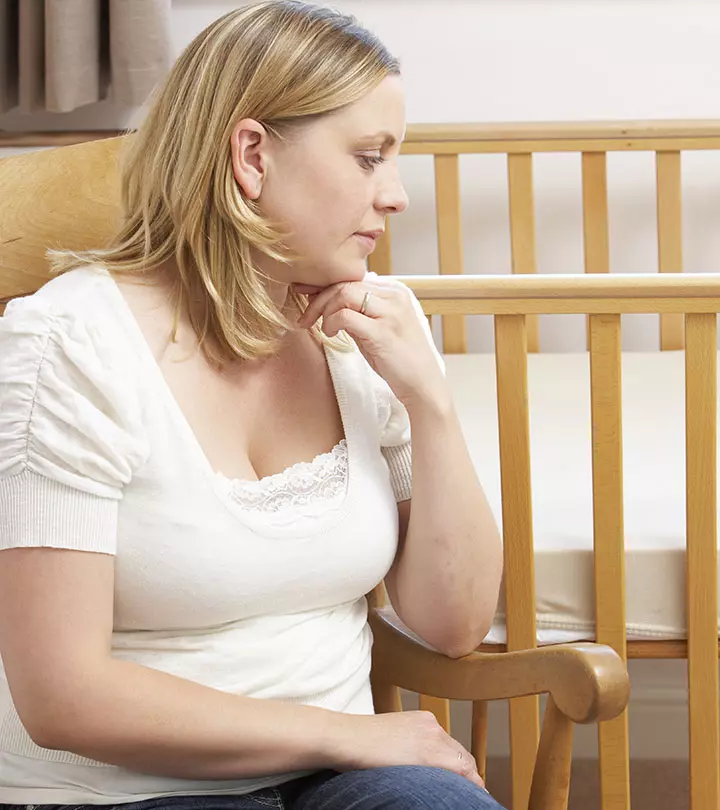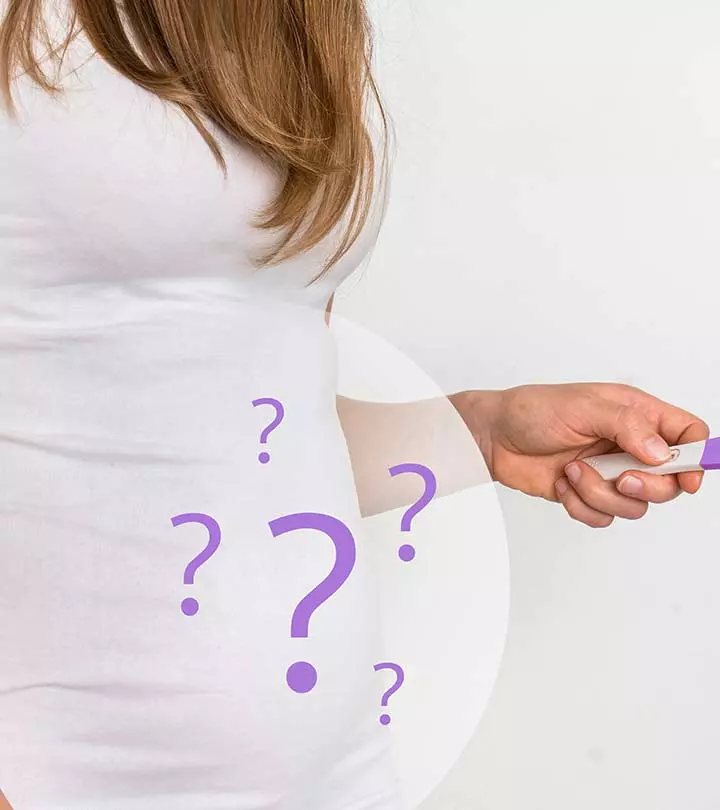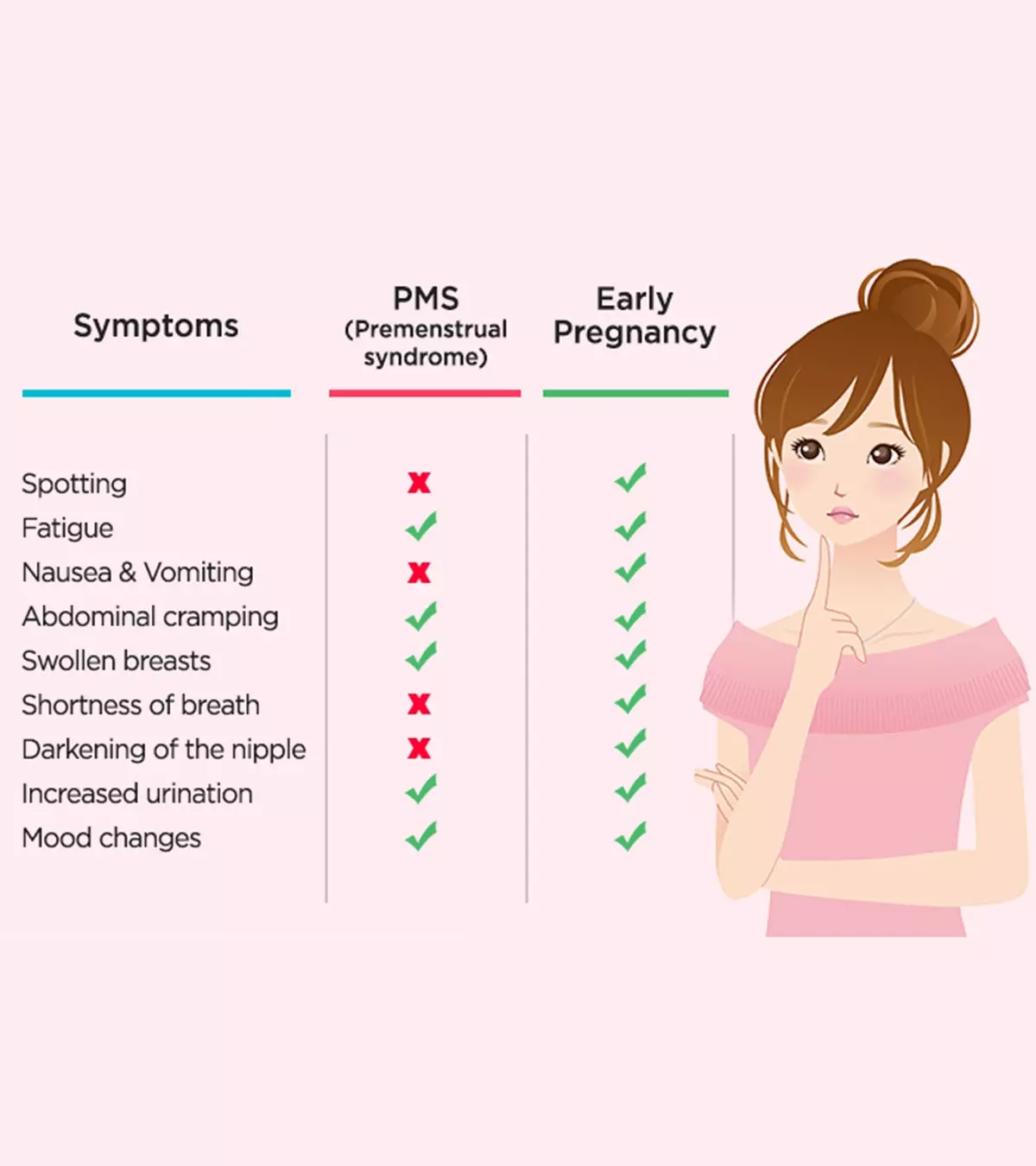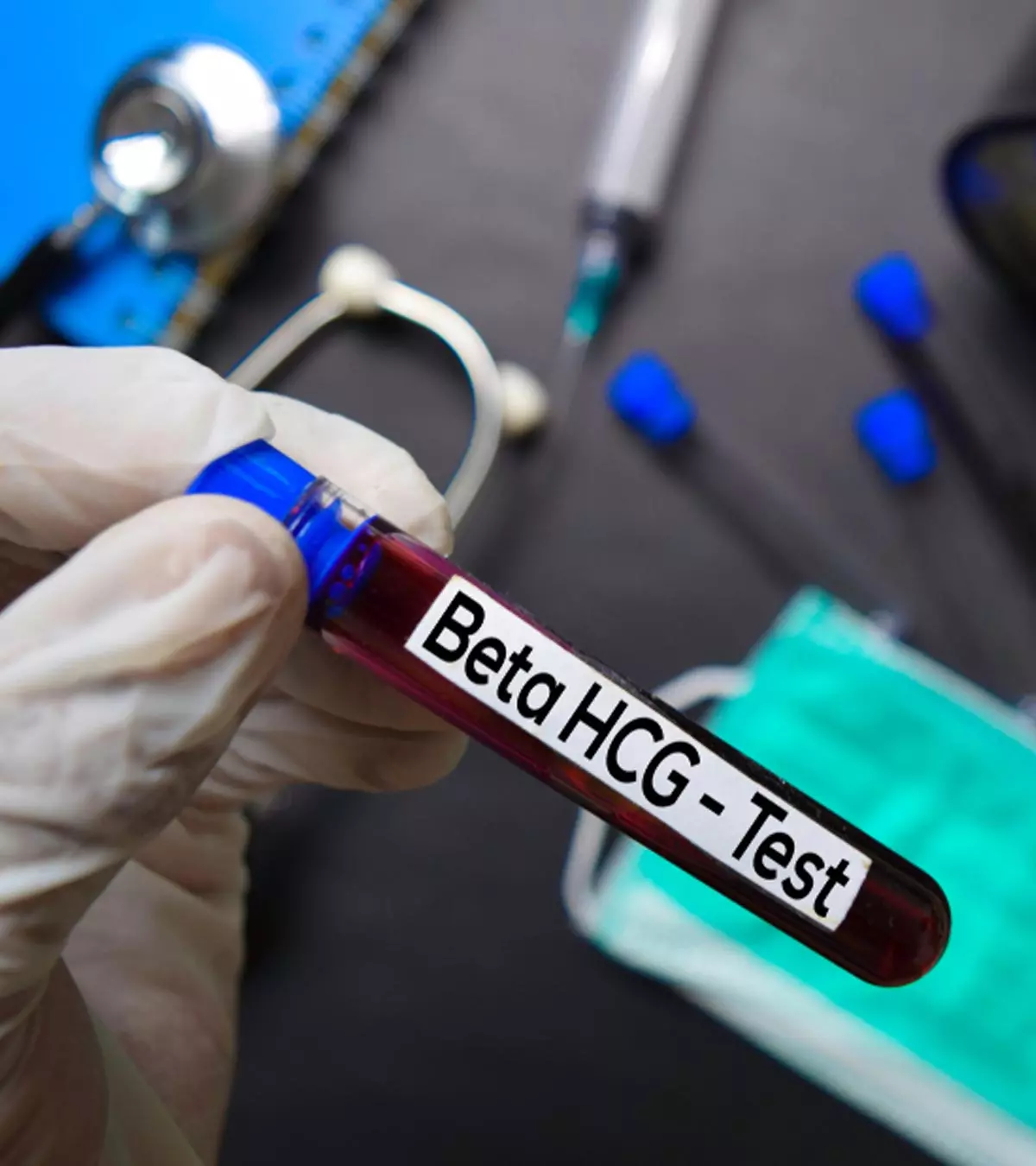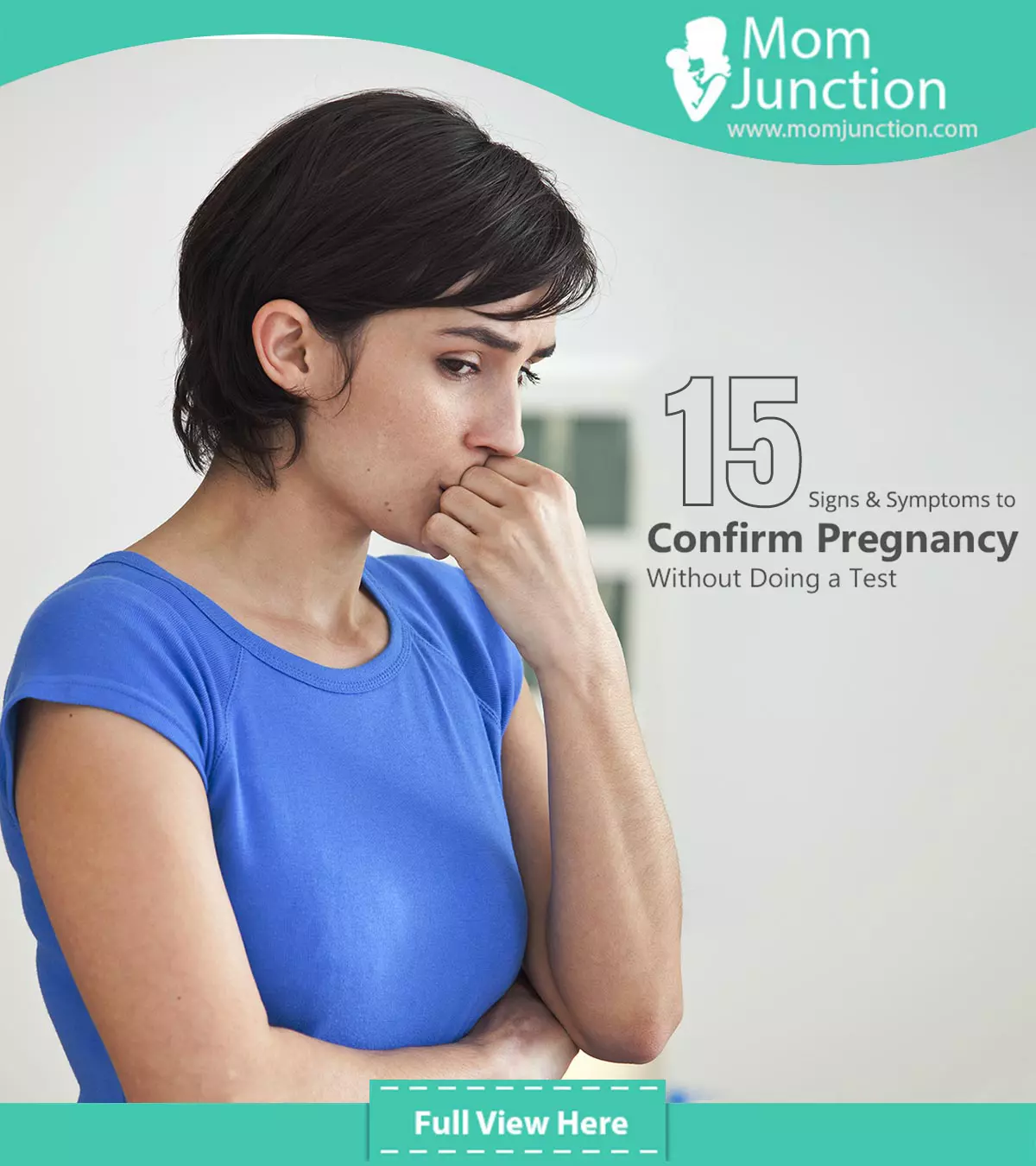
Image: MomJunction Design Team
Medical tests or home pregnancy test kits can help you confirm a pregnancy. However, if you are curious and keep asking yourself how to know you are pregnant without a test, this post is for you. The first thing that comes to mind is missed periods. This is the most common sign of pregnancy in most women. But there are other signs and symptoms as well that may or may not be that common. For instance, sore breasts and dryness of skin may indicate conception in some women. In this post, we have compiled a list of all such unique as well as common symptoms that might let you know if you are pregnant. However, it is advisable that these should not be taken as the only indicators of pregnancy, and a doctor’s consultation is a must for confirmation.

Key Pointers
- One of the most obvious indicators of pregnancy is missing a period, but there are some other less common ones as well.
- Frequent urination, sore breasts, back pain, nasal congestion, and fatigue are a few common signs of pregnancy.
- Even if you exhibit all of the pregnancy symptoms, a doctor’s appointment is still necessary to confirm your pregnancy.
16 Signs That You Could Be Pregnant
Your body may give several indications when you are pregnant. These signs that you’re pregnant can include a range of symptoms, though it’s important to note that some women may experience a few or all of these while others may not have them at all. Below are some of the indications your body could give when you are pregnant.
1. Missed periods
This is the first sign of possible pregnancy (1). However, you can miss your period for several other reasons, such as sudden weight gain or loss, regular usage of contraceptivesiMedication, device, or practice to prevent pregnancy. , stress or overexertion, and eating disorders or any gynecological problems (2). Therefore, you should do a home pregnancy test or consult a doctor about seven to ten days after your missed period to know for sure.
2. Spotting
If you notice a few drops of blood after one or two weeks of your last period, this could be implantation bleeding.
Spotting occurs when the embryo implants itself in the uterus wall (3). But it can happen for other reasons too, and it may not be easy to know if the spotting is specifically due to implantation. Also, not all women experience spotting.
3. Nausea and vomiting

Some women might have nausea and morning sickness as early as three weeks from conception. You might feel nauseous at the smell, taste, or even thought of food. It could be an indication that the hormonal levels are rising, and a probable sign that your body is preparing for pregnancy (4).
Not all women have it so early during pregnancy, and some may not have it at all in the first month.
4. Constipation and bloating
Women might experience gas, bloating, flatulenceiPassing gas from the digestive system through the anus. , constipation, and excessive belching due to the rising progesterone levels, which relax the smooth muscle tissue in the gastrointestinal tract affecting the digestion process(5). This can make you feel full even after small meals.
Pregnancy is not the only reason for abdominal bloating. You could have this feeling also due to indigestion, acidity, etc.
 Quick tip
Quick tip5. Sore breasts and tingly nipples
A few women complain of sore, painful, and tender breasts. The areolas and nipples might turn darker, and there could be small spots around the nipples (7). You may also see some pimple-like white spots around the areolaiPigmented area surrounding the nipples .
These changes in breasts could be mistaken to be a symptom of PMS symptoms and not of pregnancy, or vice-versa.
6. Frequent urination
In some cases, hormonal changes could increase blood flow and water retention, filling the bladder more frequently than before. Also, the growing uterus exerts pressure on the bladder, causing frequent and increased urination (8).
This sign could be confusing, especially in the winters, when the cold climate naturally increases your urge to pee. Some other reasons for frequent urination are urinary incontinence and an overactive bladder.
7. Back pain

Your lower back could ache just like how it does before and during a period. The pain occurs around the sacroiliac jointiJoint that connects the base of the spine with the hip bone. (9).
However, as the pain is like that you get during your period, it can be misleading and may not be a clear indication of your pregnancy.
8. Headaches
Headaches can also be signs of pregnancy and may be experienced early in the gestation period (10). But headaches are so generic that they cannot be considered a standalone symptom of pregnancy. You may check for other signs of pregnancy and see if they are occurring at the same time as the headaches to determine the pregnancy. If the headaches are too frequent or severe and cause dizziness, consult a doctor.
9. Irritability or mood swings
You could feel oversensitive, grumpy, and tearful due to hormonal changes altering the levels of neurotransmitters or chemical messengers to the brain. This could result in heightened emotions, both positive and negative (11). But such feelings could be like your PMS symptoms and may not necessarily help in determining pregnancy.
10. Food aversions/cravings

Changes in appetite, craving for some foods, or developing an aversion to some smells due to changes in smell perception could be a sign of pregnancy. You may have these cravings and aversions at any time during pregnancy (12).
Dhee, a mother of two from the US, experienced changes in her smell and taste sensitivity before she took a positive pregnancy test. She says, “I couldn’t stand the smell of cooking rice and raw onions. Rice is a staple in our house, so it felt bizarre waking up one day and feeling like throwing up because I smelled the rice being cooked in the rice cooker. I also felt sick whenever I smelled a strong perfume (i).”
 Point to consider
Point to consider11. Fatigue and sleeplessness
The rising progesteroneiFemale hormone that plays a vital role in pregnancy. levels, nausea, and frequent urination could lead to sleeplessness and fatigue. You may feel energetic in the second trimester, and tiredness might return in the third trimester (14).
You may have sleeplessness or insomnia due to other reasons, such as stress, depression, poor sleeping habits, or medications as well.
12. Palmar erythema
In some cases, you may notice redness on your palms, also referred to as red palms. It might occur due to abnormal estradiol (a female sex hormone) levels in women (15).
Some other reasons for this could be genetics, liver diseases, autoimmune diseases, infections, or other lifestyle changes.
13. Nasal congestion

Rising hormonal levels and blood production may affect the mucous membranesiInner lining in body cavities and some organs that secrete a thick, slippery liquid called mucus. in the nostrils and make them swell, dry, and bleed. This could, therefore, lead to a runny or stuffy nose (16).
Just like headaches, nasal congestion is a generic symptom and not unique to pregnancy. Therefore, you need to check this in conjunction with other pregnancy symptoms.
 Be watchful
Be watchful14. Low sexual desire
Research shows that some pregnant women have observed that their sexual desire had come down in the first trimester and then progressively decreased as the pregnancy progressed. However, the evidence is retrospective (18).
15. Acne
An increase in hormonal activity might result in acne breakouts, just like it could happen during menstruation (16). According to the American College of Obstetricians and Gynecologists (ACOG), many women experience acne during pregnancy. For some, existing acne worsens, while others who typically have clear skin may develop acne for the first time during pregnancy (19). Another study reports, “Up to 42% of pregnant women suffer from acne. In 90% of these women, the disease existed before pregnancy. In 1/3, however, acne relapsed during pregnancy after a prior disease-free period. 60% acne deteriorated during pregnancy (20).”
16. Cramping
Feeling mild cramps, just like you would during periods, is also a common sign of pregnancy. These cramps are usually mild, and they come and go. However, if the cramping or the pain is intense or if the pain is usually only on one side of the body, then contact your healthcare provider, as it could be a sign of an ectopic pregnancy or any other complication (21).
A mother and vlogger share her early symptoms of pregnancy before she took a pregnancy test. She says, “Six days after ovulation because I had tracked it on my chart, I experienced implantation cramping. For me, it felt like strong, sharp, stabbing pains in the center of my stomach. While I know the ovaries are on both sides, and it might make sense to feel implantation cramping on one side or the other, I distinctly felt it in the center. These pains lasted for about five minutes and occurred a couple of times throughout the day. It gave me a sign that either my cycle was about to start, or this was it – we were pregnant (ii).”
The symptoms listed above, along with some other symptoms, including high basal body temperature, cervical mucus changes, and increased vaginal discharge, could be the signs of pregnancy. Still, they can also occur due to other health reasons (22). Also, you may not have any of these symptoms and still be pregnant.
While these signs may not be definitive indicators of pregnancy, they can help you decide when to take a pregnancy test or consult a healthcare provider for further evaluation.Dr. Kimberly Langdon, a US-based obstetrician/gynecologist, says, “Pregnancy hormone changes can cause mood swings, irritability, and other changes in behavior. However, not all sudden behavioral changes indicate pregnancy. These changes can also indicate premenstrual syndrome (PMS) and other conditions that cause female hormonal imbalances.”
Frequently Asked Questions
1. Are the natural signs of detecting pregnancy accurate?
The natural signs may or may not indicate a pregnancy because they might overlap with the symptoms of other health issues or could happen due to general hormonal fluctuations before the menstrual period. A home pregnancy test or a blood test is the best way to confirm that you are pregnant.
2. After how many days can pregnancy be confirmed?
Pregnancy can be confirmed as early as a week after a missed period if you are taking a home pregnancy test. A blood test can give you the result sooner. The presence of hCG hormone in the urine usually takes longer time to show than that in the blood.
3. When to visit a doctor to confirm pregnancy?
You may visit your doctor once your home pregnancy test shows positive or if you missed your period for two consecutive cycles. Mostly, doctors suggest you visit around eight weeks of probable pregnancy, or earlier if you have any medical condition or had problems with your previous pregnancy (23).
4. Can you use non-medical ways to confirm that you are pregnant?
Non-medical ways have been used to determine pregnancy, long before pregnancy test kits were not in use. However, these homemade pregnancy tests and other non-medical methods may not be accurate and do not have any scientific backing.
5. Can I have the symptoms of early pregnancy and not be pregnant?
“PMS can also show signs and symptoms similar to pregnancy, such as breast tenderness, mood changes, cravings, and bloating. Women of reproductive age who come to the clinic can be reassured by taking a timely pregnancy test. However, a rare condition known as pseudocyesis may occur when a non-pregnant woman believes she is pregnant, but tests would reveal the absence of a developing fetus. This condition is thought to be caused by an intriguing interplay of psychological and biological factors,” observes Dr. Langdon.
5. Does the salt pregnancy test work?
The medical research available is not sufficient to establish the efficacy of the salt pregnancy test.
6. What is the color of urine in early pregnancy?
Pregnancy is not known to alter the color of urine. However, inadequate water intake, dehydration, and other complications may lead to color changes in the urine.
How to confirm pregnancy without doing a test is a common curiosity many women have. You may undergo medical tests or perform home urine tests to confirm pregnancy. Although some early pregnancy symptoms may help confirm pregnancy without a test, these are not always accurate. Missed periods, spotting, sore breasts, and nausea are early signs of pregnancy. In addition, some women may experience nasal congestion, low sexual desire, food cravings or aversions, and fatigue in early pregnancy weeks. If women keep track of their ovulation and menstruation, and if their cycles are regular, they may be able to detect pregnancy sooner.
Infographic: Early Pregnancy Signs Due To Hormonal Alterations
Taking a home pregnancy test, followed by a legitimate lab test, is the ideal way of confirming that you are expecting. Nevertheless, most women experience at least a few typical early pregnancy symptoms. This infographic highlights some signs that may indicate you are pregnant.
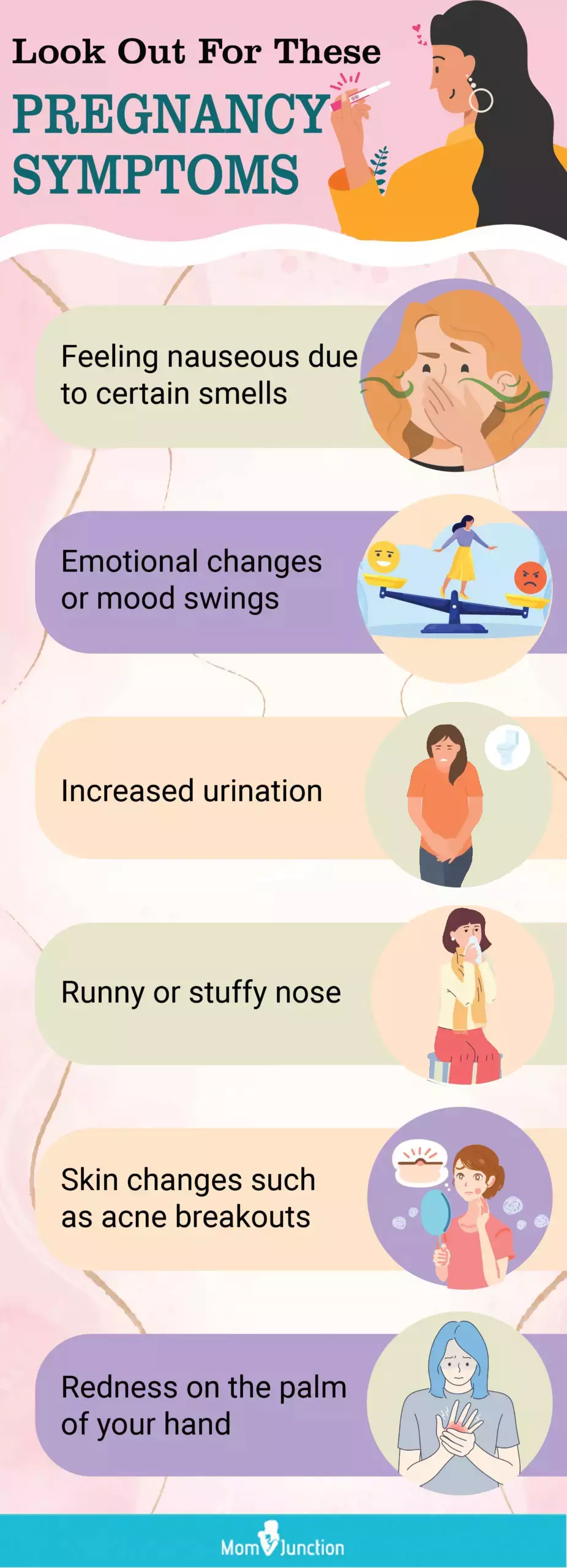
Illustration: Momjunction Design Team
Illustration: Ways To Confirm Pregnancy Without Doing A Test
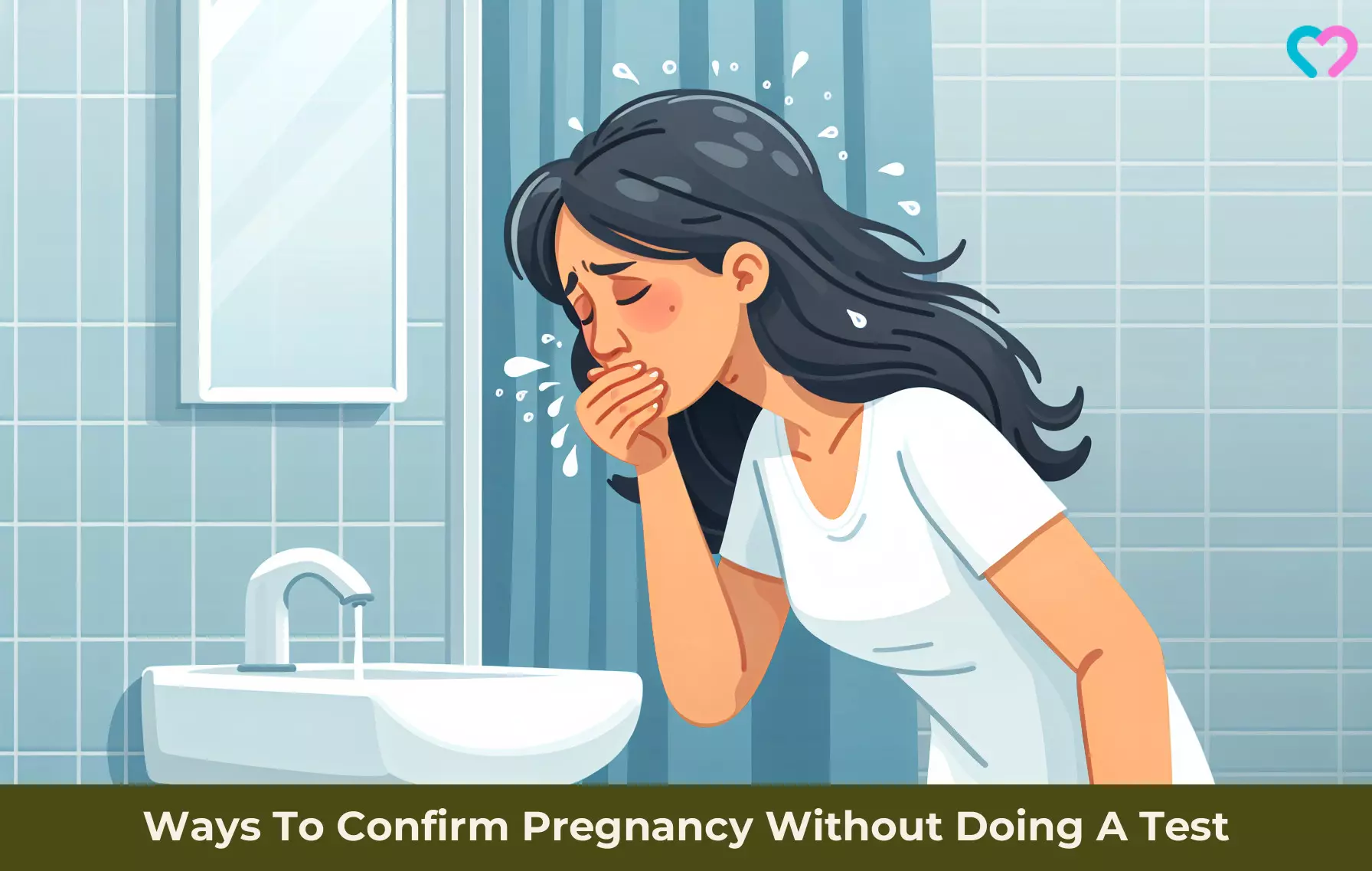
Image: Dall·E/MomJunction Design Team
Personal Experience: Source
MomJunction articles include first-hand experiences to provide you with better insights through real-life narratives. Here are the sources of personal accounts referenced in this article.
i. Early Pregnancy Symptoms How I Knew I was Pregnant before BFP;https://www.youtube.com/watch?si=lL39ay9hmEFKbxpq&v=xjTD10ydl7k&feature=youtu.be
ii. How I Knew I Was Pregnant BEFORE a Positive Pregnancy Test | EARLIST SIGNS OF PREGNANCY;
https://www.youtube.com/watch?feature=shared&v=c93YcmyClx8
References
- Pregnancy.
https://www.cedars-sinai.org/health-library/diseases-and-conditions/p/pregnancy.html - 9 reasons your period is late (if you’re not pregnant).
https://vitalrecord.tamu.edu/9-reasons-missed-period/ - Vaginal bleeding in early pregnancy.
https://medlineplus.gov/ency/patientinstructions/000614.htm - Noel M Lee and Sumona Saha; (2013); Nausea and Vomiting of Pregnancy.
https://pmc.ncbi.nlm.nih.gov/articles/PMC3676933/ - Magan Trottier et al; (2012); Treating constipation during pregnancy.
https://pmc.ncbi.nlm.nih.gov/articles/PMC3418980/ - Pregnancy Constipation.
https://my.clevelandclinic.org/health/diseases/21895-pregnancy-constipation - Signs and symptoms of pregnancy.
https://www.nhs.uk/pregnancy/trying-for-a-baby/signs-and-symptoms-of-pregnancy/ - Neurogenic Bladder.
https://www.rush.edu/conditions/neurogenic-bladder - Jennifer Sabino and Jonathan N Grauer; (2008); Pregnancy and low back pain.
https://pmc.ncbi.nlm.nih.gov/articles/PMC2684210/ - Headaches in Early Pregnancy.
https://www.hopkinsmedicine.org/health/conditions-and-diseases/staying-healthy-during-pregnancy/headaches-in-early-pregnancy - Lori L Altshuler et al; (2000); An Update on Mood and Anxiety Disorders During Pregnancy and the Postpartum Period.
https://pmc.ncbi.nlm.nih.gov/articles/PMC181144/ - Appetite changes and food aversions during pregnancy.
https://www.pregnancybirthbaby.org.au/appetite-changes-and-food-aversions-during-pregnancy - Pregnancy.
https://www.nhs.uk/start-for-life/pregnancy/ - Cristina A Reichner; (2015); Insomnia and sleep deficiency in pregnancy.
https://pmc.ncbi.nlm.nih.gov/articles/PMC4935047/ - Rocco Serrao et al; (2007); Palmar erythema.
https://pubmed.ncbi.nlm.nih.gov/18039017/ - Common Discomforts During Pregnancy.
https://www.beaumont.org/conditions/pregnancy-common-discomforts - Baby (and tissues!) on board: Tips for managing pregnancy rhinitis.
https://utswmed.org/medblog/pregnancy-stuffy-nose-rhinitis/ - Pamela C Regan et al.; (2003); Pregnancy and changes in female sexual desire: A review.
https://www.researchgate.net/publication/233488650_Pregnancy_and_Changes_in_Female_Sexual_Desire_A_Review - Skin Conditions During Pregnancy.
https://www.acog.org/womens-health/faqs/Skin-Conditions-During-Pregnancy?utm_source=redirect&utm_medium=web&utm_campaign=otn - S K Bechstein and F Ochsendorf; (2017); Acne and rosacea in pregnancy.
https://pubmed.ncbi.nlm.nih.gov/28070633/ - Am I Pregnant?
https://my.clevelandclinic.org/health/articles/9709-pregnancy-am-i-pregnant - Early Symptoms of 5 Days Past Ovulation (DPO).
https://www.narayanahealth.org/blog/early-symptoms-of-5-days-past-ovulation-dpo - What happens during prenatal visits?
https://www.nichd.nih.gov/health/topics/preconceptioncare/conditioninfo/prenatal-visits
Community Experiences
Join the conversation and become a part of our nurturing community! Share your stories, experiences, and insights to connect with fellow parents.
Read full bio of Dr Sachchidananda Maiti
- Dr. Kimberly Langdon is a gynecologist with 19 years of experience wherein she delivered more than 2,000 babies. She is currently working as vice-president, product development and research at Physician Integrative Laboratories in the US. She did her doctor of medicine from the Ohio State University.
 Dr. Kimberly Langdon is a gynecologist with 19 years of experience wherein she delivered more than 2,000 babies. She is currently working as vice-president, product development and research at Physician Integrative Laboratories in the US. She did her doctor of medicine from the Ohio State University.
Dr. Kimberly Langdon is a gynecologist with 19 years of experience wherein she delivered more than 2,000 babies. She is currently working as vice-president, product development and research at Physician Integrative Laboratories in the US. She did her doctor of medicine from the Ohio State University.
Read full bio of Rebecca Malachi
Read full bio of Swati Patwal
Read full bio of Dr. Joyani Das






